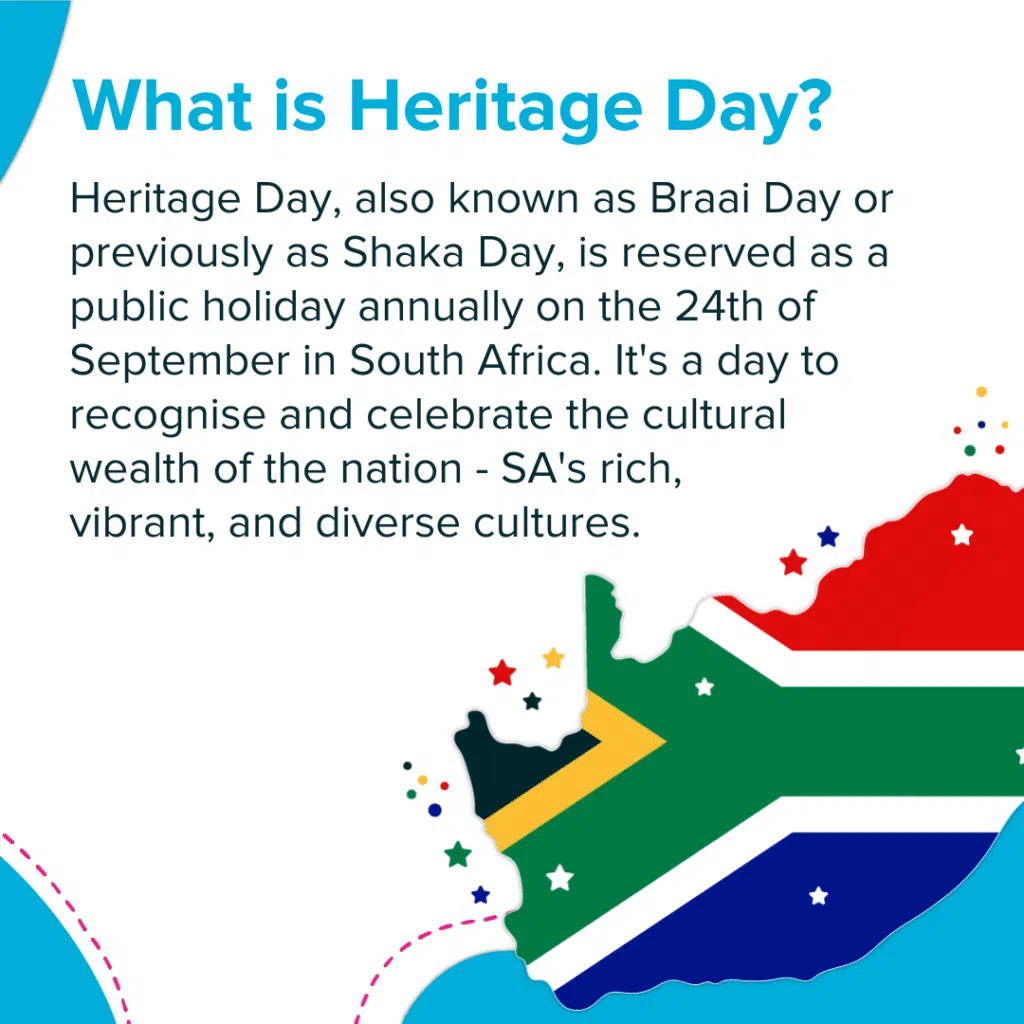What is celebrated on September 24th in South Africa?

- Understanding Heritage Day: What is Celebrated on September 24th in South Africa?
- The Significance of September 24th in South African Culture
- How Heritage Day is Celebrated Across South Africa
- Festivities and Traditions on September 24th: A Deep Dive
- Why Heritage Day Matters: Embracing Diversity on September 24th
Understanding Heritage Day: What is Celebrated on September 24th in South Africa?
Heritage Day, celebrated on September 24th, is a significant public holiday in South Africa that honors the rich cultural diversity and heritage of the nation. This day serves as a reminder of the various traditions, customs, and histories that shape South African society. Established as a public holiday in 1996, Heritage Day encourages citizens to embrace their roots and acknowledge the unique tapestry of cultures that coexist within the country.
One of the key aspects of Heritage Day is the celebration of the different ethnic groups that contribute to South Africa's identity. The day is marked by a variety of festivities, including traditional music, dance, and cuisine. People are encouraged to wear traditional attire, which showcases the vibrant colors and patterns representative of their heritage. This celebration not only fosters a sense of belonging but also promotes mutual respect and understanding among diverse communities.
On Heritage Day, South Africans engage in numerous activities that highlight their cultural backgrounds. Common practices include:
- Family Gatherings: Many families come together to share traditional meals, often featuring dishes unique to their cultural backgrounds.
- Cultural Performances: Various events are held across the country, showcasing traditional music and dance, allowing people to experience the rich artistic heritage of different groups.
- Community Events: Local communities often organize festivals and parades that invite participation from all, reinforcing the spirit of unity and shared heritage.
Heritage Day also aligns with the concept of "Braai Day," where many South Africans take part in barbecuing, symbolizing the informal and communal spirit of the country. This aspect of the celebration highlights the importance of food as a unifying factor, bringing people from different backgrounds together to enjoy a meal. By celebrating Heritage Day, South Africans not only honor their individual and collective histories but also foster a sense of national pride and unity.
The Significance of September 24th in South African Culture
September 24th holds a special place in the hearts of South Africans as it is celebrated as Heritage Day. This day serves as a reminder of the rich tapestry of cultures, languages, and traditions that make up the nation. Heritage Day was officially declared a public holiday in 1996, following the end of apartheid, and it aims to promote national unity and cultural diversity. On this day, South Africans from various backgrounds come together to celebrate their unique heritages while acknowledging their shared history.
Celebrations on Heritage Day often include a variety of cultural events and activities that showcase the country's diverse traditions. People participate in local festivals, traditional dance performances, and music shows that reflect the vibrant cultures found throughout South Africa. Many individuals also take the opportunity to wear traditional attire, which serves as a visual representation of their cultural identity. Furthermore, it is common for families to prepare and share traditional meals, highlighting the culinary diversity that exists within the nation.
Another significant aspect of September 24th is its focus on education and awareness. Various institutions, including schools and community organizations, host events that educate citizens about the importance of preserving their cultural heritage. This emphasis on education encourages younger generations to appreciate and take pride in their roots, fostering a sense of belonging and community. Additionally, many South Africans use this day to reflect on the struggles and achievements of their ancestors, reinforcing the importance of history in shaping contemporary society.
Promoting Unity and Reconciliation is a key theme of Heritage Day, as it encourages South Africans to embrace their differences while celebrating their commonalities. This day serves as a platform for dialogue and understanding among various cultural groups, promoting a sense of belonging for all citizens. By recognizing and honoring the myriad of cultures that coexist in South Africa, September 24th plays a vital role in fostering a unified nation that values diversity as a strength.
How Heritage Day is Celebrated Across South Africa
Heritage Day, celebrated on September 24th, is a vibrant and significant occasion in South Africa, showcasing the country’s rich tapestry of cultures, traditions, and histories. Across the nation, people engage in various activities that reflect their unique heritage. This day serves as a reminder of the importance of cultural diversity and the need for unity among South Africans.
One of the most popular ways to celebrate Heritage Day is through traditional food and cuisine. Families and communities gather to prepare and enjoy a feast that often includes local delicacies such as boerewors, bunny chow, and chakalaka. Many people also take this opportunity to showcase their cooking skills, passing down recipes from generation to generation. In urban areas, food festivals and markets often pop up, offering a chance for people to experience the flavors of different cultures all in one place.
Another key aspect of Heritage Day celebrations is cultural performances and displays. Various events are organized throughout the country, featuring traditional music, dance, and art. For example, in some regions, you may witness vibrant Zulu dances or hear the soulful sounds of Xhosa music. Schools and community centers often host cultural exhibitions that allow individuals to share their customs and stories, fostering a deeper understanding and appreciation for South Africa's diverse heritage.
Furthermore, many South Africans use this day to participate in community service and outreach programs. This reflects the spirit of ubuntu, emphasizing the interconnectedness of all people. Local organizations and groups often organize activities that encourage individuals to give back to their communities, whether through volunteering, cleaning up local parks, or hosting workshops that promote cultural awareness. These initiatives help to strengthen community bonds and reinforce the values of respect and solidarity among different cultural groups.
Festivities and Traditions on September 24th: A Deep Dive
September 24th is a day marked by a variety of celebrations and cultural observances across the globe. One of the most notable festivities on this date is the National Punctuation Day in the United States. This quirky holiday encourages individuals to appreciate the importance of punctuation in written communication. Enthusiasts often celebrate by sharing their favorite punctuation marks and engaging in fun writing exercises that highlight the significance of proper grammar.
In many countries, September 24th is also recognized as Heritage Day in South Africa. This public holiday celebrates the nation’s diverse cultural heritage, emphasizing unity in diversity. Festivities include traditional music, dance, and food, as communities come together to showcase their unique customs. Local gatherings often feature cultural performances, storytelling sessions, and art exhibitions that reflect the rich tapestry of South African life.
Another tradition observed on this date is the Feast of Our Lady of Mercy, celebrated by many Christian denominations. This feast day honors the Virgin Mary as the Mother of Mercy and is marked by special church services, prayers, and processions. In various regions, devotees participate in charitable activities, helping those in need as a way to embody the spirit of mercy and compassion that the day represents.
Additionally, September 24th is often associated with various local festivals and events that celebrate the changing seasons. Many communities hold harvest festivals, showcasing the bounty of the season with fresh produce, artisanal goods, and local crafts. These gatherings not only promote community spirit but also provide an opportunity for people to connect with their agricultural roots and appreciate the importance of sustainable practices.
Why Heritage Day Matters: Embracing Diversity on September 24th
Heritage Day, celebrated on September 24th, serves as a powerful reminder of the rich tapestry of cultures that coexist within our societies. This day is not just a date on the calendar; it is an opportunity to acknowledge and celebrate the diverse traditions, languages, and histories that shape our identities. By embracing diversity, we foster a sense of unity and understanding among different communities, promoting respect and appreciation for one another’s backgrounds.
Recognizing Cultural Contributions
One of the core reasons Heritage Day matters is that it highlights the significant contributions of various cultural groups. From indigenous practices to contemporary artistic expressions, each culture adds a unique flavor to our collective heritage. By recognizing these contributions, we can:
- Enhance cultural awareness
- Encourage dialogue and interaction between different communities
- Promote the preservation of endangered traditions
Celebrating Heritage Day allows individuals to share their stories, fostering a greater appreciation for the diversity that enriches our lives.
Building Community and Solidarity
Heritage Day also plays a crucial role in building community and solidarity among diverse groups. By coming together to celebrate our differences, we can break down barriers and combat stereotypes. This communal celebration creates a platform for individuals to engage with one another, share experiences, and learn from each other. Activities such as cultural festivals, storytelling sessions, and food fairs not only bring people together but also help to create lasting memories and friendships.
Moreover, embracing diversity on Heritage Day strengthens social cohesion. When communities unite to celebrate their unique heritages, they cultivate an environment of mutual respect and understanding, which is essential for peaceful coexistence in an increasingly globalized world.
Inspiring Future Generations
Lastly, Heritage Day is vital for inspiring future generations to appreciate and celebrate diversity. By instilling a sense of pride in one’s heritage, children and young adults are encouraged to explore their cultural roots and learn about the traditions of others. Educational programs and community events centered around Heritage Day provide valuable opportunities for youth to engage with diverse histories and practices, fostering an inclusive mindset that can shape a more harmonious future.
Leave a Reply

Other celebrations and holidays